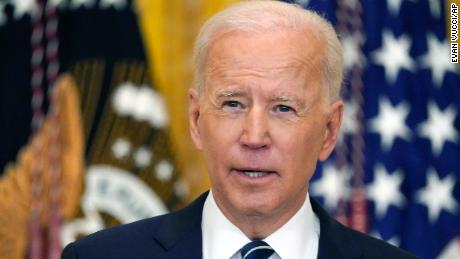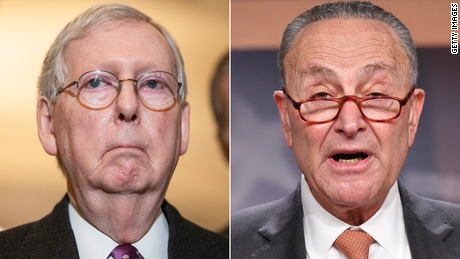Georgia’s new voting restrictions give Democrats reason to push filibuster change but Senate realities remain
“I don’t want to have the debate about the larger issue of the filibuster, because if we don’t get this part done, if we don’t solve the democracy crisis, the rest of it is irrelevant,” Abrams said during a streamed conversation with former President Bill Clinton this week. “It is not only an existential crisis we face, it is a moral imperative that we not allow a procedural rule to destroy the most durable democracy the world has known.”
But that thought process runs into Sen. Joe Manchin of West Virginia, the lone Senate Democrat who opposes his party’s bill to expand voting access. Manchin has called for changes to the proposal and demanded that the Senate’s two party leaders — Democrat Chuck Schumer of New York and Republican Mitch McConnell of Kentucky — instead coalesce around more targeted changes to protect voting rights.
“For the sake of our country, I’m begging the President, I’m begging the leadership … Chuck, I’m begging. Open your mind up, Mitch,” Manchin told CNN. “We need to come around holistically on a voting rights bill because we had an insurrection. It was over voting. And now you’re about ready to put a divisive bill that’d be going down along party lines, and you already want to scrap the filibuster completely?”
Manchin added: “That is so wrong — in the most divided times, and the most violent times I’ve lived in, to even divide it further.”
To appeal to Manchin, Democrats are proposing a narrow change to the Senate’s rules to ensure there is a “carve-out” to allow any voting rights legislation to be advanced by 51 votes, rather than 60 votes currently required to break a filibuster. Yet Manchin has told CNN repeatedly that he’s firmly opposed to any special carve-out, and other Democratic senators, such as Kyrsten Sinema of Arizona and Jeanne Shaheen of New Hampshire, have voiced opposition to lowering the 60-vote threshold. To change the rules of the Senate, all 50 members of the Senate Democratic Caucus would need to agree.
Voting rights has become a premier issue for Democrats, with many in the party believing that Republicans are looking to thwart Democratic success in 2020 by passing restrictive bills.
These Democratic fears reached a fever pitch this week after Republican Georgia Gov. Brian Kemp signed a bill that imposes tighter voting restrictions in the state just months after a Democratic presidential candidate won Georgia for the first time since Bill Clinton in 1992. The new law imposes stricter requirements for absentee ballots and limits the use of ballot drop boxes, among other things.
President Joe Biden, in a win for those hoping for a filibuster carve-out, said this week that he has an “open mind” about changing filibuster rules on “certain things that are just elemental to the functioning of our democracy.” He then cited “the right to vote” as one of those instances.
“This is a solution in search of a problem. The turnout in the 2020 election was the highest since 1900,” McConnell said. “This is clearly an effort by one party to rewrite the rules of our political system.”
Multiple GOP aides say Democrats haven’t had conversations with Republicans about building a coalition to amend voting rights on a bipartisan basis. Instead, one Senate GOP aide argued that the bill was merely a reprise of messaging legislation the House passed in 2019 when there was absolutely no chance it would pass in the Senate.
The lack of Republican interest in the Senate, however, is exactly why activists have pushed passing a voting rights bill through any means necessary. Abrams and others have argued that protecting the right to vote is the preeminent issue facing the party at the moment.
Former Attorney General Eric Holder has also argued that the conversation about getting rid of the filibuster altogether ignores the importance of protecting the right to vote.
“This isn’t about the damn filibuster. It’s bigger than that that,” Holder tweeted on Thursday. “This is about the kind of country we want to have: our democracy is at risk. We must fight Republican attempts — all over the country — to cheat and suppress Americans right to vote.”
But Democrats’ discussions about creating a special carve-out for the filibuster on legislation relating to voting rights are also a nonstarter for Republicans, who argue that killing the filibuster at all is a step in the wrong direction.
For Democrats, the challenge is balancing the wishes of many on the left of their caucus with the relentless commitment to protecting the filibuster by some of the moderates — namely Manchin.
The pressure from outside groups, however, is not weighing on the Democratic caucus, said Democratic Sen. Tim Kaine of Virginia, who said that intensity from the outside — including from progressive members of the House of Representatives — would do little to actually change the rules of the Senate. That decision, he said, is one that only the caucus could make.
But some Democrats have argued that Republican intransigence has shifted feelings about the filibuster.
“Over the course of this year, there has been a very significant change in feelings about McConnell’s strategy of obstruct and delay, in part because we saw it on such vivid display in 2009, 2011 and 2012,” said Sen. Jeff Merkley, am Oregon Democrat who’s a leader on filibuster overhaul in the Senate.
![]()








